Related Research Articles
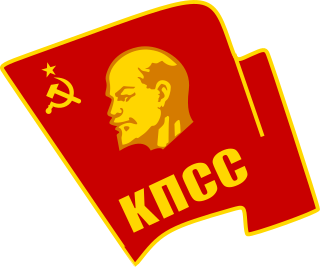
The Communist Party of the Soviet Union (CPSU), at some points known as the Russian Communist Party (Bolsheviks) and All-Union Communist Party (Bolsheviks), sometimes referred to as the Soviet Communist Party (SCP), and formerly known as the Bolshevik Party, was the founding and ruling political party of the Soviet Union. The CPSU was the sole governing party of the Soviet Union until 1990 when the Congress of People's Deputies modified Article 6 of the 1977 Soviet Constitution, which had previously granted the CPSU a monopoly over the political system. The party's main ideology was Marxism-Leninism.
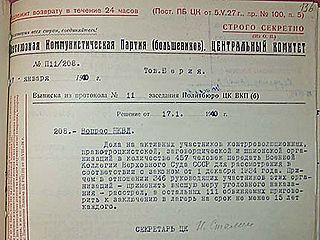
A politburo or political bureau is the highest political organ between convocations of the central committee and the party congress for communist parties. It is present in most former and existing communist states.
A communist state is a form of government that combines the state leadership of a communist party, Marxist–Leninist political philosophy, and an official commitment to the construction of a communist society. Communism in its modern form grew out of the socialist movement in 19th-century Europe and blamed capitalism for societal miseries. In the 20th century, several communist states were established, first in Russia with the Russian Revolution of 1917 and then in portions of Eastern Europe, Asia, and a few other regions after World War II. The institutions of these states were heavily influenced by the writings of Karl Marx, Friedrich Engels, Vladimir Lenin, Joseph Stalin and others. During most of the 20th century, around one-third of the world's population lived in communist states. However, the political reforms of Soviet leader Mikhail Gorbachev known as Perestroika and socio-economic difficulties produced the revolutions of 1989, which brought down all the communist states of the Eastern Bloc bar the Soviet Union. The repercussions of the collapse of these states contributed to political transformations in the Soviet Union and Yugoslavia and several other non-European communist states. Presently, there are five communist states in the world: China, Cuba, Laos, North Korea and Vietnam.

The New Communist Party of Britain is an anti-revisionist Marxist–Leninist communist party in Britain. The origins of the NCP lie in the Communist Party of Great Britain from which it split in 1977. The organisation takes an anti-revisionist stance on Marxist–Leninism and is opposed to Eurocommunism. After the fall of the Soviet Union the party was one of two original British signatories to the Pyongyang Declaration in 1992. It publishes a newspaper named The New Worker.
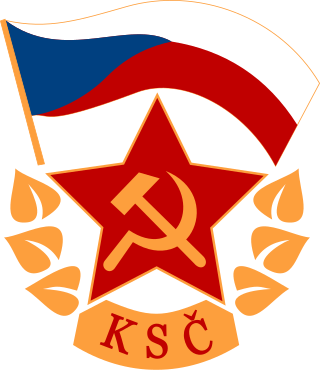
The Communist Party of Czechoslovakia was a communist and Marxist–Leninist political party in Czechoslovakia that existed between 1921 and 1992. It was a member of the Comintern. Between 1929 and 1953, it was led by Klement Gottwald. The KSČ was the sole governing party in the Czechoslovak Socialist Republic though it was a leading party along with the Slovak branch and four other legally permitted non-communist parties. After its election victory in 1946, it seized power in the 1948 Czechoslovak coup d'état and established a one-party state allied with the Soviet Union. Nationalization of virtually all private enterprises followed, and a command economy was implemented.

The Sammarinese Communist Party was a Marxist political party in the small European republic of San Marino. It was founded in 1921 as a section of the Communist Party of Italy (PCI). The organization existed for its first two decades as an underground political organization.

The Party of Labour of Albania (PLA), also referred to as the Albanian Workers' Party (AWP), was the ruling and sole legal party of Albania during the communist period (1945–1991). It was founded on 8 November 1941 as the Communist Party of Albania but changed its name in 1948. The party was dissolved on 13 June 1991 and succeeded by the Socialist Party of Albania. For most of its existence, the party was dominated by its First Secretary, Enver Hoxha, who was also the de facto leader of Albania.
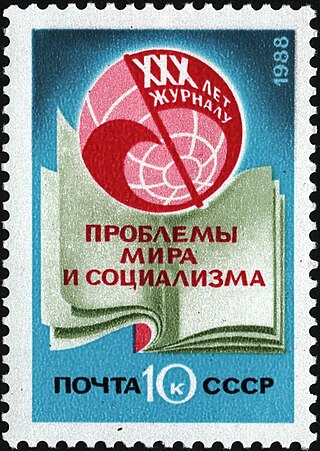
Problems of Peace and Socialism, also commonly known as World Marxist Review (WMR), the name of its English-language edition, was a monthly theoretical journal containing jointly-produced content by Communist and workers' parties from around the world, published from September 1958 to June 1990.

The Ministry of External Relations (MER) of the Union of Soviet Socialist Republics (USSR) was founded on 6 July 1923. It had three names during its existence: People's Commissariat for Foreign Affairs (1923–1946), Ministry of Foreign Affairs (1946–1991) and Ministry of External Relations (1991). It was one of the most important government offices in the Soviet Union. The Ministry was led by the Minister of Foreign Affairs prior to 1991, and a Minister of External Relations in 1991. Every leader of the Ministry was nominated by the Chairman of the Council of Ministers and confirmed by the Presidium of the Supreme Soviet, and was a member of the Council of Ministers.

The Central Committee of the Communist Party of the Soviet Union was the executive leadership of the Communist Party of the Soviet Union, acting between sessions of Congress. According to party statutes, the committee directed all party and governmental activities. Its members were elected by the Party Congress.
The organization of the Chinese Communist Party (CCP) is based upon the Leninist concept of democratic centralism.
Carsten Walfrid Thunborg was a Swedish politician.

The office of leader of the League of Communists of Yugoslavia (LCY) was first established on 23 April 1919 under the name "Political Secretary of the Central Committee". However, in reality, power in this period was shared in a collective leadership with the "Organisational Secretary of the Central Committee". When the office of political secretary changed its name in November 1936 to "General Secretary of the Central Committee", the position became more powerful. It kept that name until its abolishment on 4 October 1966, when it was replaced by the "President of the Central Committee". This office lasted until 4 May 1980, when Tito died and was replaced with the "President of the Presidency of the Central Committee". With several branches having already left the LCY, the remaining members of the Central Committee of the 13th Congress established the office of "Coordinator of the Presidency of the Central Committee". Three days later, on 26 May, the 14th Congress rejourned and elected a provisional leadership, with the leader holding the office of "Chairman of the Committee for the Preparation of the Congress of Democratic and Programmatic Renewal of the Central Committee". The officeholder was the de facto leader of the Socialist Federal Republic of Yugoslavia.

Following the military take-over in Indonesia and the massacres of 1965–66, the Albanian capital Tirana became one of the main hubs for exiled members and sympathizers of the pro-Chinese wing of the Communist Party of Indonesia (PKI). According to prof. Justus van der Kroef there were about forty Indonesian communists staying in Tirana in the early 1970s, around half of them organized in the Persatuan Peladjar Indonesia. The Tirana-based group often acted as spokespersons of the party.
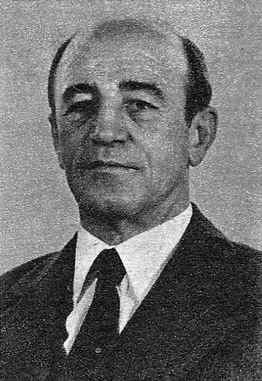
Prokop Murra was an Albanian politician of the Albanian Party of Labour (PPSh).
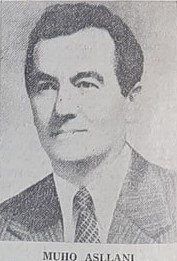
Muho Asllani is a former Albanian politician of the Albanian Party of Labour (PPSh). He was a member of the Politburo, a representative in the Albanian Parliament for many years, First Secretary of Party in several districts, and member of the Cabinet of Albania during 1976–79.
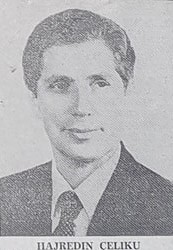
Hajredin Çeliku was a former Albanian politician of the Albanian Party of Labour. He was a member of the Albanian Parliament, Politburo of the Party of Labour of Albania, and served as member of the Cabinet of Albania.

Kiço Mustaqi was a former Albanian general and politician of the Albanian Party of Labour. He served as Chief of the General Staff of Albanian People's Army, the last Minister of Defence of the communist era in Albania, and was a member of the Politburo.

Xhafer Spahiu was an Albanian politician of the Albanian Party of Labour (PPSh). He was the only Kosovar Albanian of the higher ranks of the Communist Albania leadership after 1948.

The 6th Congress of the Party of Labour of Albania was held in Tirana 1–7 November 1971. The party congress coincided with the 30th foundation anniversary of the party.
References
- ↑ "Albania Politburo 1944-1991". Archived from the original on 2019-02-11. Retrieved 2018-08-27.
- ↑ Eastern Christianity and the Cold War, 1945-91, p.154
- ↑ The International Year Book and Statesmen's Who's Who, 1983 International Publications Service, Jan 1, 1983, p.23
- ↑ Richard Staar (1977), Yearbook in Communist Affairs (1977 ed.), Hoover Press
- ↑ Richard Staar (1982), Communist Regimes in Eastern Europe (4 ed.), Hoover Press, p. 10, ISBN 0-8179-7692-2, LCCN 81-84232
- ↑ Communist and Marxist parties of the world, Charles Hobday, Roger East, Longman, 1990, p.167
- ↑ Miranda Vickers, James Pettifer, ed. (1997), Albania: From Anarchy to a Balkan Identity, New York University Press, p. 297, ISBN 9780814787953, OCLC 36663098